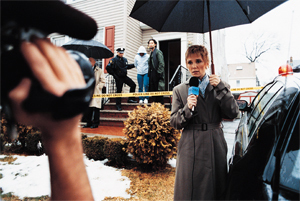5 Things I Didn't Know About Health Care (Until I Got Sick)
In 2011, I entered a period of ill health so terrible that I bankrupted a couple of insurance companies and caused an entire hospital to collapse in despair, killing hundreds. I'm mostly better now, and the lawsuits are almost all sorted out, but along the way I learned a few things. Like ...
The Medical System Is Hopelessly Outdated

My own particular brand of chronic suck-health was hyperparathyroidism, a condition caused by a tiny benign tumor in the neck that causes kidney issues, nausea, cognitive problems, depression, and hellish, lie-in-bed-all-day-weeping fatigue. It can usually be cured with a single surgery, but people suffering from the condition often spend years shuffling painfully between baffled specialists before getting our necks mercifully slashed open like an Opposite Day episode of Dexter. Why is it that one of the few chronic health conditions that has a magic cure-bullet is so hard to diagnose properly? It's because of today's system of medical specialization, which has been in place since transportation had to be fed and watered, and hasn't changed much since then.
Imagine that police solved cases by dividing crime scenes up into physical segments and then not talking to each other about them. The guy who is looking for the murder weapon has no idea what the body looks like. The guy who is measuring the blood-splatter patterns doesn't know that a wild dog came onto the scene 20 minutes ago and ran away with the victim's leg. The crime-scene tech discovers a Bloodsport-style fighting ring in the basement with a fight still going on in it, but doesn't bother to tell the detective. This is pretty much what the medical system is like today.

"Police are theorizing that the body was stolen by demons."
Sick people with potentially curable illnesses are shunted around between separate specialists who don't pay attention to anything except the body part they've been trained to focus on, a problem known as care fragmentation or "butt doctors only look at butts." You might get sent to a dermatologist who is baffled by your skin rash, because it's caused by a food allergy and nobody knew much about food allergies when they invented dermatology. Or you'll visit six different psychiatrists who all fail to cure your crippling depression, because none of them ever thought to test to see if it was caused by an asshole thyroid.
Because of care fragmentation, sick people often have to coordinate their own care if they want to get treated correctly. But that's not as easy as it sounds, because ...
There's No Conception of the Mental Side of Physical Problems

A lot of us still imagine the human body as this dualistic wonderland where our physical problems don't affect our brain or thinking. So while healthy people might be sympathetic to the physical limitations of the ill, they imagine that apart from that, it's not that different from being healthy. And hey, sometimes that's true. But often it's not. In my case, the illness that was fucking with my body was fucking with my mind as well, because some illnesses are just slutty that way.
Here's a window into what life is like when your brain is being battered by a chronic illness: You come home from a 12-hour day at work and stumble in the door only to find that half of your apartment is flooded because the toilet is blocked up. With bees. After disposing of the last of the angry poop-scented insects, you finally collapse on the couch, only for someone to hand you a 10-page form and tell you to fill out your entire life history, and then organize 10 separate doctor's appointments with receptionists who have all lost your files. And all the while, you know for an absolute fact that you'll have to fill them out again within the next couple of weeks for the same reason.

"Why do they need to know my dog's name?"
That's what it's like to deal with the medical system when you're one of the people that the system is designed for. You have to organize appointments, get insurance permission, deal with referrals, and keep track of medical records, all while your brain and body are running like Internet Explorer on a seven-year-old machine you just spilled Diet Coke on. You need to organize transportation to doctor's offices if you're too sick to drive. And after all that, you have to conjure the mental energy to speak intelligently to the doctor and remember all their instructions so you don't burst into flames by taking the wrong medication at the wrong time.
At my worst, I had to be dropped off directly in front of the door to the doctor's office, because I couldn't concentrate enough to drive safely, and walking across the parking lot was like climbing a mountain with a flopping goat strapped to my back. And I was one of the lucky ones: I was still relatively able-bodied, and I had good insurance, so I didn't have to argue with an HMO or plea down hospital bills like dealing with a mafia loan shark at a time when I could barely pull myself out of bed. After that experience, I'm constantly amazed that more chronically sick people don't just lie down and die.

"Let me strangle myself with that stethoscope."
You also gotta deal with the fact that ...
If Medicine Doesn't Understand Your Condition, They'll Assume You're Just Crazy

Did you know that hypothyroidism used to be caused by fits of hysteria? And morning sickness was caused not by hormones, but by a woman trying to unconsciously reject her baby by vomiting it up? When it comes to unexplained symptoms, doctors have never been very good at saying, "Wow, I really don't know what is causing this problem. Perhaps we'll know in the future, when we have flying cars and such." Instead, patients are often told that they're hypochondriacs, mentally ill, or just plain faking it to get attention. This is still happening today, with little-understood conditions like fibromyalgia and chronic fatigue. And don't think you can avoid this by developing a relatively well-known illness: You can have a medical condition that's been in the scientific literature for decades, but if your doctors were asleep in class that day, they'll be happy to call you a hypochondriac, too. Several doctors did it to me.

They were right. Faking illness was the only way I could indulge my crippling blood-pressure-cuff fetish.
Look, I get it. If a plumber told you, "Hell, I have no idea what's going on with the pipes in your house. There's a lot about pipes that we humans just don't understand," you'd think he was an awful plumber. And our expectations for doctors are often even higher, because it's scary to think that the body is a complex system that not even smart, educated people fully understand. So we can't really blame doctors if they don't want to admit that they have no idea what is causing the third arm to grow out of our foreheads.
But still, maybe medical science could notice this historical trend of misdiagnosing legitimate illnesses as hysterical lies, and admit that if a bunch of people all start having the same physical symptoms, maybe they're not all just anxious or trying to get attention? Because trust me, there are many ways to get attention, and any of them would be more fun than the one that involves telling a total stranger details about your poop.

"Why don't you go ahead and squeeze one off for me, and we'll have a look in person."
But honestly, doctors aren't the worst offenders when it comes to potentially misunderstanding illness. Other laypeople are. Because ...
People Will Assume That Your Sickness Is Your Fault

No matter what kind of long-term illness you have, you will eventually run into this person. The one who remains convinced that, despite what doctors say, you are sick because you just haven't tried enough. "But have you tried positive thinking?" they ask you. "What about switching to an all-raw lembas diet?" "Why don't you try having tantric sex with organic dolphins?"
Yes, sometimes these people are just trying to help, and obviously there's nothing wrong with trying to live healthily. But as your illness progresses and nothing works and these people still won't shut the hell up, you start to notice something darker behind this attitude. There's this lurking assumption that health and illness are always within our control, and that if a person is sick, it must somehow be their fault. The attitude is a manifestation of a mental bias called the Just World Hypothesis (I assume "Ignorant Bullshit" was taken), the belief that the world is fair and that bad things do not happen to good people. So sick people are never sick because they have been randomly bitch-slapped by bad luck -- it's because they're not thinking positively, they're having too much sex (or not enough), they ate food with "chemicals" in it instead of consuming pure energy, and so on.

"She must have done something. Probably stole something from a child."
Now, obviously some diseases are preventable, and we should not all resume licking the floor in the Guangdong First American Toys and Lead Smelting Factory because human health is subject purely to the capricious whims of Fate. But the depressing truth is that, ultimately, our health is not in our control. You or I could come down with cancer or rheumatoid arthritis or Suddenly Liking Nickelback Syndrome tomorrow, and all the vegan diets and positive thinking in the world might not keep you safe. But that idea is soul-wrenchingly terrifying, so a lot of people make themselves happier by simply pretending that it isn't true. And if that means stigmatizing sick people, so be it.
You'll Probably Be Invisible

Television and movies generally feature two categories of sick people. First, there's the character who gets sick and is then cured completely when it's time for the plot to move on. Second, the plucky, cheerful disabled or dying character who's there to make the healthy characters feel better about their own lives. And then during ad breaks there's the pharmaceutical ads, which are always populated by people like this:

Because nothing says "multiple sclerosis" like a fun run.
Real illness is rarely like that. Sometimes even successful treatment doesn't cure you; it just makes life go from "Star Wars Episode I-level awful" to "Star Wars Episode III-level bearable." Sometimes illness doesn't teach you anything, or make you a better person. But because so many of us rely on the quick and/or life-affirming versions of illness we've seen on television and in movies, we tend to discourage real-life experiences when they don't match up. Cancer sufferers discover that people don't want to listen when they express understandable feelings of anger or depression, because everyone expects people with cancer to be strong and courageous so that we can repeat their uplifting stories in email forwards. People who are sick for years might find that friends who were understanding at first gradually start to drift away, as if they're thinking, "Didn't you have surgery already once? Isn't that story arc over yet? For God's sake why aren't you doing a fun run?"
Things aren't much better in the nonfiction parts of the media, either. Remember that Just World Hypothesis? The comforts of its delusional embrace mean that stories about sick people who got what they deserve are always far more popular than potentially unsettling stories about people who got sick through no fault of their own. Instead of coverage of people who are fat because of thyroid problems or PCOS or genetics, we have reality shows that feature overweight people eating cheeseballs off the floor. News reports skip over the hundreds of people who got dick cancer through no fault of their own and focus on that one guy who drilled a hole in a nuclear reactor and had sex with it.

Bucket list complete.
No, there's probably not a lot you can do to fix the system -- that has to come from the people who run it -- but hopefully I've at least helped prepare you for it. Trust me, expecting the clusterfuck will save you even more medical bills on fist repairs.
C. Coville is now cured of all non-cannibalism-related brain problems, and has a Twitter here and a Tumblr here.
Always on the go but can't get enough of Cracked? We have an Android app and iOS reader for you to pick from so you never miss another article.






